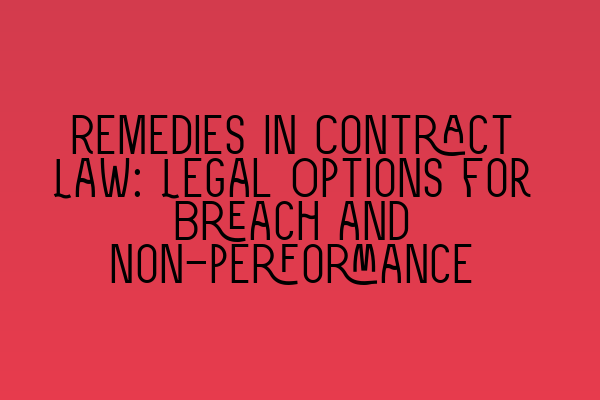Remedies in Contract Law: Legal Options for Breach and Non-performance
In the world of contract law, it is essential for parties to understand their rights and options in the event of a breach or non-performance. Contracts are legally binding agreements that establish the obligations of parties involved. When one party fails to fulfill their contractual duties, the other party may seek remedies to address the breach and mitigate any harm caused.
In this blog post, we will explore the various legal options available to parties in contract disputes. Whether you are a solicitor representing a client or an individual seeking information on your rights, this guide will provide you with valuable insights.
1. Damages: The most common and straightforward remedy for breach of contract is the award of damages. Damages are monetary compensation intended to place the injured party in the position they would have been in had the contract been fully performed. There are different types of damages, such as compensatory, consequential, and nominal damages, depending on the circumstances of the breach. To learn more about damages in contract law, you can check out our comprehensive guide on SQE 1 Practice Exam Questions.
2. Specific Performance: In some cases, the injured party may seek a specific performance remedy. This remedy requires the breaching party to fulfill their obligations as outlined in the contract. Specific performance is typically reserved for contracts involving unique items or services that cannot be easily replaced or replicated. For instance, if a buyer enters into a contract to purchase a rare piece of artwork and the seller breached the contract, specific performance may be sought to compel the seller to deliver the artwork. To delve deeper into specific performance, you can refer to our article on SQE 1 Practice Mocks FLK1 FLK2.
3. Rescission: Rescission is a remedy that allows the injured party to cancel the contract and return to the state before the contract was entered into. This may be appropriate when a contract was induced by fraud, mistake, duress, or undue influence. Rescission aims to restore the parties to their pre-contractual positions and eliminate any unjust enrichment that may have occurred. To learn more about rescission and its applications, our article on SQE 2 Preparation Courses provides comprehensive information.
4. Restitution: Restitution is a remedy that aims to restore the injured party to the position they were in before entering into the contract. Unlike damages, which focus on compensating for losses suffered, restitution seeks to reverse any benefits the breaching party received as a result of the contract. This remedy is often used in cases where the contract is unenforceable or has been rescinded. To gain a deeper understanding of restitution in contract law, you can refer to our guide on SQE 1 Preparation Courses.
5. Injunctions: In certain situations, an injured party may seek injunctive relief to prevent a breach of contract or non-performance from occurring. An injunction is a court order that prohibits a party from taking a specific action or requires them to perform certain actions. This remedy is commonly used when monetary damages would be insufficient or impracticable. Injunctions are available in both temporary and permanent forms, depending on the circumstances. To learn more about injunctions and their applications, you can refer to our article on SRA SQE Exam Dates.
Conclusion
Understanding the remedies available in contract law is crucial for both solicitors and individuals involved in contract disputes. Whether seeking damages, specific performance, rescission, restitution, or injunctive relief, parties should carefully assess their options and consult with legal professionals to determine the most appropriate course of action.
We hope this blog post provided you with valuable insights into the legal options for breach and non-performance in contract law. If you have any further questions or need assistance with a contract dispute, do not hesitate to reach out to our team of experienced solicitors at SQE Contract Law.
